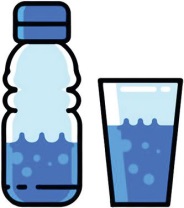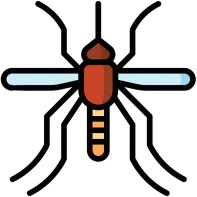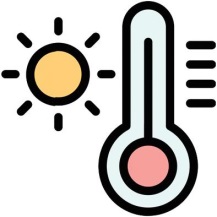BEATING THE HEAT : TAKING MEASURES TO ENSURE A SAFE SUMMER
IntellectAbility created a document titled "The Great Outdoors! Warm Weather Edition." (replacingrisk.com/idd-resources), specifically for people with intellectual and developmental disabilities to help make the great outdoors more enjoyable for all.

SUN PROTECTION
The sun's rays can cause sunburn in as little as 10 minutes. Here are some precautions to conder:
- Limit exposure, especially during the hottest parts of the day between 10 AM and 2 PM
- Use SPF (sun protection factor) of 30 or greater
- Reapply sunscreen at least every 2 hours, more frequently if sweating or swimming
- Utilize clothing that has an SPF rating when available
- Many Medications that can increase light sensitivity of the skin and/or eyes. Examples include some antibiotics, antidepressants, antihistamines, blood pressure medications, antipsychotics, anti-seizure medications, and others. Discuss these with your pharmacist or physician.

HYDRATION
Fluid loss is greater when people are in warmer climates, participating in physical activities, and actively sweating. Maintaining proper body fluid levels is essential.
- Encourage fluid consumption regularly
- Popsicles, sno-cones, and frozen juices can assist in maintaining hydration
- Fruits and vegetables with lots of juice can help, like watermelon, peaches, plums, salad greens, radishes, cauliflower, and others
- Consider intake of extra fluids before going outside or participation in physical activities
It’s important to know the signs of dehydration and to act fast. Signs include:
- Skin dryness and tenting (not quickly returning to shape when gently pinched upward)
- Eyes sunken
- Dry mouth, lips
- No tears
- Darker colored urine
- Decreased urine output
- Change in level of consciousness
If any of these are noted, it's important to seek medical attention right away.

INSECTS
Biting and stinging insects are an outdoor nuisance. Consider these steps to reduce the likelihood of interference with your fun:
- Use insect repellent per the manufacturer’s instructions. Take caution not to overuse as too much DEET can be harmful to a person
- Cover exposed skin when hiking as possible to reduce tick bites
- Bright colored clothing attracts bees. Light clothing attracts ticks but repels mosquitoes
- Inspect skin after outdoor activities looking for ticks and other insect bites
- Avoid areas with fire ants
- Have epi-pens available, if prescribed, for people who have severe allergic reactions

HEAT EXHAUSTION AND HEAT STRIKE
The most important things to do to reduce heat exhaustion and heat stroke are staying hydrated and limiting exposure to the sun and to indoor spaces that lack adequate air conditioning. People with disabilities and those over 65 years old are at particular risk. Freezing damp towels and placing them around a person's neck can help one keep cool. Lightcolored clothing absorbs less heat and is cooler than dark colors. Certain medications can block the body's ability to cool down naturally, and extra precautions should be exercised. Here are signs of heat-related conditions:
Heat Exhaustion
- Nausea
- Light-headedness
- Fatigue
- Muscle cramps
- Dizziness
Heat Stroke (THIS IS A MEDICAL EMERGENCY!)
- Headache
- Confusion
- Absence of sweating
- Rapid heart rate
- Nausea and vomiting
- Loss of consciousness
- Elevated body temperature
A heatstroke is a medical emergency! Here is what to do:
- Call 911 immediately
- Have the person lie down
- Move the person to a shady, cooler area or an air-conditioned room or vehicle
- Remove tight clothing or extra layers to facilitate cooling while maintaining dignity
- Wipe exposed skin with cool cloths